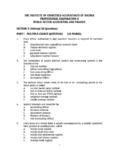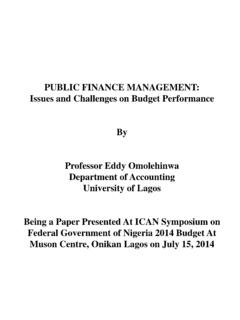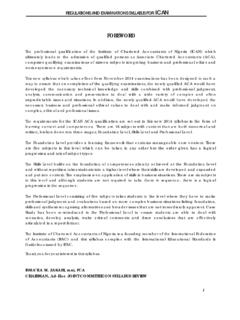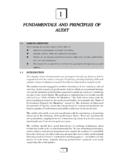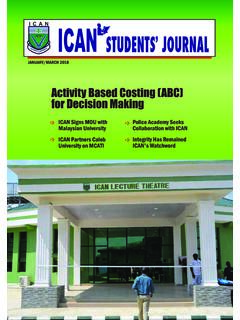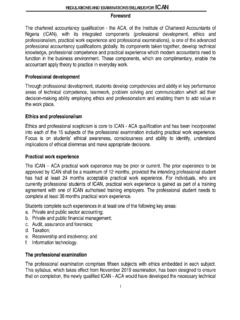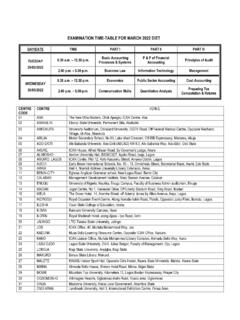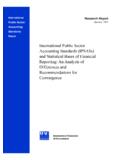Transcription of Powered by: KPMG - Institute of Chartered Accountants of ...
1 Powered by: Powered by:KPMGA PRESENTATION AT ANNUAL CONFERENCE OF THE Institute OF Chartered Accountants OF NIGERIA. THE IMPLEMENTATION OF THE international PUBLIC SECTOR ACCOUNTING STANDARDS (IPSAS) IN NIGERIA: THE JOURNEY SO OTUNLA, FCAACCOUNTANT-GENERAL OF THE federation /CHAIRMAN,FAAC SUB-COMMITTEE ON IPSAS of Presentation Objectives of the Presentation Introduction What is IPSAS? Benefits of IPSAS Adoption IPSAS Nigeria Governance Structure Key Milestones Achieved Key Milestones Achieved IPSAS Migration Period Stakeholders in IPSAS Implementation in Nigeria Role of the Institute Role of the Treasury Steps towards Successful implementation to IPSAS Accruals in 2016 Critical success factors Conclusion3 Objectives of the Presentation At the end of this presentation, the members of theInstitute would be able to: Appreciate the Policy Thrust of GovernmentAdoption of IPSAS UnderstandwhatIPSAS isandthebenefits UnderstandwhatIPSAS isandthebenefits Appreciate the IPSAS Governance Structure inNigeria Understand the key milestones of implementation ofIPSAS Note the agreed timeline for IPSAS implementationin Nigeria4 Objectives of the presentation cont d Appreciate the key stakeholders in IPSAS implementation/RolesoftheAccountants especially ICAN members Notethestepsplannedtowards Notethestepsplannedtowardssuccessful implementation of IPSASA ccrual Basis by 2016 Highlight critical success factors5 Introduction The Federal Executive Council (FEC) at its meetingof 28thJuly, 2010 approved that the Countryshould adopt the provisions of the InternationalFinancial Reporting Standards (IFRS) and IPSAS forPrivate and Public Sectors respectively.
2 TopositivelyimplementthedecisionofFEC,th e TopositivelyimplementthedecisionofFEC,th eFederation Account Allocation Committee (FAAC)at its meeting held on 13thJune, 2011 set up aTechnical Sub-Committee to provide a Roadmapfor the implementation of IPSAS in the three tiersof government in Nigeria. The Sub-Committee had membership from thethree tiers of is IPSAS ? international Public Sector Accounting Standards (IPSAS) are a set of accounting standards issued by the IPSAS Board for use by public sector entities around the world in the preparation of financial statements. The standards are issued by the international Public Sector Accounting Standard Board (IPSASB,) an independent body set up by the international federation of Accountants (IFAC). Government Business Enterprises (GBEs) are to apply the international Financial Reporting Standards (IFRS) used by the private sector. Financial Reporting Standards (IFRS) used by the private sector. 7 ObjectiveObjectiveScopeScope To improve the quality of general purpose financial reporting by public sector entities, leading to better informed assessments of the resource allocation decisions made by governments, thereby increasing transparency and accountability For application by national, states and localgovernments IPSAS are widely used by intergovernmental organisationsPolitical and Economic Significance.
3 Political BenefitsPolitical Benefits Accountability:increased disclosure inaccounting reports; Transparency:Fulldisclosureofgovernment financial transactions; Decisionmaking:Providetheexecutive EnhancedImplementationoftheFreedomofInfo rmation8 Decisionmaking:Providetheexecutiveand legislature with bases for theirdecisions on the allocation of resources; Basis for efficient and effective publicsector management; Improved Credibility/Integrity:Standards independently set and known world-wide; international Best Practice & Comparability: IPSAS seeks to ensure that financial statements are comparable across jurisdictions; Enables Stakeholders to assess how welltheir resources have been (FOI)Act2011:Theaccountabilityandtranspa rency requirementsof IPSAS are consistentwithandsupportstheprovisions of the NigerianFOI Act 2011 which seekstopromoteaccesstogovernment informationPolitical and Economic Significance ..Economic BenefitsEconomic Benefits Aggregate Reporting:Adoption ofIPSAS will ensure a holistic reporting ofgovernment financial transactions andpositions; Improved Service Delivery:Greateraccountability and transparency, willimproveValueforMoney(VFM)spending; Competitiveness in theglobal market place Increased Cross-borderInvestment and ForeignDirectInvestment:9spending; Enhance Public-Private Partnershiparrangements:collaborativeeff ortsbetween the public and private sectorsaredeepened due to use of similarstandards; Comparability:IPSAS and IFRS aresimilar and this common basis makesfor convergence in accounting of bothsectors on comparable matters BuildingconfidenceinDonorAgencies and Lenders:increases thecountry s access to international aids /loans and other developmentassistance.
4 DirectInvestment:increases the propensityto generate more cross-border and foreign directinvestmentsthroughgreater transparency anda lower cost of capital forpotential investorsFGN/State Ministerial Steering Committee (Policies on IPSAS )FGN/State IPSAS Implementation CommitteeGovernance Structure for IPSAS implementation-Federal/State LevelFAAC Sub-Committee on IPSASIPSAS Project Management TeamAssets and Liabilities Division (Federal/State Treasury)Special Teams(a)IPSAS Technical Study Group (Team)(b) Valuation and Property ServicesTeam(c) NCOA Development Team(Programme segment etc)(d) Fund Management Team(e)IPSASC ompliantFinancialOffice of the Auditor General for the federation /State 10 IPSAS Focal point MDA and IPSAS Implementation Team at each MDA(e)IPSASC ompliantFinancialStatements Focal point MDA and IPSAS Implementation Team at each MDAIPSAS Focal point MDA and IPSAS Implementation Team at each MDAIPSAS Focal point MDA and IPSAS Implementation Team at each MDAKey Milestones Achieved The following activities have beenachieved by the IPSAS Committee: Enlightenment/Sensitization: Political Leaders in the three tiers of Government ontheneedfortheadoptionofIPSAS;theneedfo rtheadoptionofIPSAS; Exposure of IPSAS to stakeholders in the three tiersof Government; Sensitization Workshops for Stakeholders in the sixgeo-political zones of the country; Procurement and Distribution of a book, IPSASE xplained by Thomas Muller; and Training of identified key Milestones Achieved Cont d.
5 Training on the developed National Chart ofAccounts (NCOA), Users Manual of the NCOA andthe format of the General Purpose FinancialStatements (GPFS) for IPSAS Cash and Accrual; ConductedGapAnalysisofIPSAS intheFederal ConductedGapAnalysisofIPSAS intheFederalGovernment, 36 States, Federal Capital Territory(FCTA) and the Local Government Councils (LGC); Collaboration with the World Bank and OtherDevelopment Partners; Development of NCOA; Preparation of the Users Manual of the NCOA12 Key milestones on IPSAS implementation cont d. Development of Format of the GPFS-IPSAS Cash Basisincluding Statutory Reports, Statistical Reports,Performance Reports and Accounting Policies; Development of Format of the GPFS - IPSAS AccrualBasisincludingStatutoryReports,St atisticalReports,BasisincludingStatutory Reports,StatisticalReports,Performance Reports and Accounting Policies; IPSAS Compliant Budget Templates Publication of Adoption of IPSAS- What You Need toKnow ; Issuance of National Circular approved by FAACto ensurecompliance by all Public Sector Entities13 IPSAS Migration period Based on the recommendations of the Sub-Committee,FAAC has approved the adoption of IPSAS as follows:20142016 MIGRATION PERIOD14 IPSAS CASH BASIS20142016 IPSAS ACCRUAL BASISSTAKEHOLDERS IN the adoption and implementation of IPSAS Executive-President, Governors, Commissionersetc.
6 Legislators JudiciaryJudiciary Accounting Officers of MDA MDAs Providers of Funds (Donor Agencies) Accountants , Auditors, Valuers The Media The Civil Society of the AccountantsAs a key stakeholder in Public Financial Management(PFM), it is expected that Accountant will see to thesuccessful implementation of IPSAS in Nigeria: Support entities on ownership of the policy ProvidethestrategicdirectionforIPSAS ProvidethestrategicdirectionforIPSAS implementation in the respective MDA whereAccountants act as Consultants Ensure that the GPFS of entities they audit are in linewith the provisions of IPSAS Advise entities on the process for data migration ofIPSAS Assets and Liabilities to IPSAS Accrual Basis of the Accountants Contd. Operate within the National Vision 20:2020 andBudgetary Framework Use the NCOA for budgeting, accounting andreporting process (ensure daily postings ofaccountingrecordsofentitiesarelinetheN COA)accountingrecordsofentitiesarelineth eNCOA) Provide support in training of technical andoperating personnel Utilize the reports generated for strategicplanning and operational decisions Promote IPSAS activities in the MDA throughtraining and of the Treasury Continue to be a vibrant anchor for the adoption andimplementation of IPSAS Spearhead intensive capacity building of keystakeholders across MDAs Provide robust and integrated ICT framework for IPSAS adoption and implementation EnsurecontinuousprovisionofGPFS EnsurecontinuousprovisionofGPFS Develop and install a robust internal quality assuranceand risk management mechanism in the application ofIPSAS Identify Public Financial Management (PFM)
7 Legislations that need to be amended to be in line withIPSAS Be conversant with and disseminate developments onIPSAS18 Steps towards successful implementation of IPSAS accrual by 2016 Implementation of the approved Governance Structure for IPSAS in Nigeria Setting up of Steering Committee (Policy Organ of IPSAS )IPSAS ) Setting up of IPSAS Implementation Committee by the Federal Government (Implementing the Polices) Setting up of IPSAS Implementation Committee at all the MDAs Setting up IPSAS Project Management Team in the OAGF19 Steps towards successful implementation of IPSAS Contd. Setting up of IPSAS Assets and LiabilitiesDivision in the Finance and AccountsDepartment in all MDA UseoftheNCOAbyPublicSectorEntities UseoftheNCOAbyPublicSectorEntities Issuance of Guidelines on transition toAccrual Accounting by 2016 Designing of Templates for thepreparation of Programme Based Budget. Setting up of IPSAS Technical Study Group20 Steps towards successful implementation of IPSAS Contd.
8 Monitoring and Evaluation of the activities ofIPSAS Implementation Committees set up by thethree tiers of Government Capacity Building of relevant implementationstakeholdersstakeholders Sourcing for appropriate Software that will driveIPSAS and the NCOA Timely review of Financial Reports and Budgetsprepared by Entities to ensure compliance with theStandards Domestication of Standards to ensure betterunderstanding by the towards successful implementation of IPSAS Contd. Technical support to Entities on issues concerningIPSAS Implementation. Ensure amendment of the Finance Control andManagement Act. Harmonisation of the Financial Regulations andthe Treasury Manual of the FGN, FinancialInstructions of States and Financial Memorandaof LG into one PFM Regulations Development of Templates for the preparation ofFiscal Operations (FOP) Report of the federation ,Nigeria, highlighting key financial and Challenges Seamless consolidation of the Fiscal Reports of the three tiers of Govt.
9 With uniform reporting format of having the same Chart of Accounts. Need for the right staffing skills and levels Relevant enabling legislations need to be changed in line with reality of the requirements of with reality of the requirements of IPSAS. IT Hardware and Software development to automate the process. Relevant Accounting manuals be reviewed and rewritten. Training and retraining of Accounting personnel. Central guidance is critical Automation of the Business Process is very critical. Change Management23 Issues and Challenges Cont d Accounting curriculaneed to systematicallyconvey IPSAS to students of Accountancy. Continuing Professional Educationon Ethics andProfessional Responsibility as resource persons in cases whereIPSAS is in use. IPSAS specialist should beknowledgeable about available resources thatcan help answer professional responsibilityquestion. An IPSAS specialist should work tomaintain an environment that stresses theimportance of IPSAS adoption andimplementation24 Key Success factors Sustained Political will-Approval of FEC and FAAC Ownership Technical capacity- training, re-training and personnel developmentdevelopment Public Orientation and Enlightenment Automated Information Systems-GIFMIS Platform Adequate Finance Modular implementation-NCAO, Budget reform Legal Framework etc25 Conclusion IPSAS creates significant policy change inPFM to promote, accountability,transparency and good governance.
10 It will impact on policy, processes The process of adoption and implementationinvolves all stakeholders particularly theAccountants. Effective participation and commitment byall stakeholders are essential for a YOUN igeria has Agreed to Adopt IPSAS Necessary Framework already IPSAS Provisionsalready DevelopedPropagate the PolicyAppreciate Your Roles in the Process27
